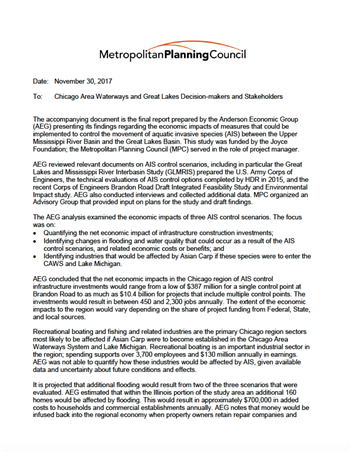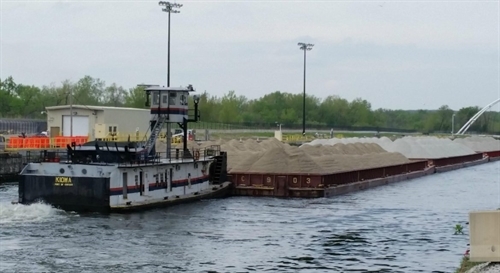
U.S. Army Corps of Engineers
Key features of the Tentatively Selected Plan for the Brandon Road Lock and Dam
We provided some perspectives on the control of Asian Carp and other aquatic invasive species back in June of this year. A lot has happened since that time. One major milestone is the U.S. Army Corps of Engineers released its Tentatively Selected Plan for controls that could be implemented at the Brandon Road Lock and Dam, near Joliet. The Corps accepted comments on this Plan through December 8, 2017. In 2018 the Corps will be reviewing the input received and determining if adjustments need to be made to the Tentatively Selected Plan.
MPC and project partners have also been busy since our last update. We had mentioned that with funding from the Joyce Foundation, we were working on an evaluation of the economic impacts or consequences of aquatic invasive species control measures. Our consultant for this study, the Anderson Economic Group (AEG), reviewed relevant documents and interviewed decision-makers and stakeholders. MPC organized an advisory group that provided input on the study and draft findings. The report summarizing the expected economic impacts has now been completed. Here are some headlnes:
Hundreds of new jobs! The AEG analysis examined the economic impacts of three control scenarios. AEG found that the net economic benefits for the Chicago region from infrastructure investments would range from $387 million for a single control point at Brandon Road to up to $10.4 billion for solutions with multiple control points. The investments would result in between 450 and 2,300 jobs annually.

Read the report MPC commissioned on the economic impacts of aquatic invasive species control measures
Recreational boating and fishing is big around here! AEG found that boating and fishing and related industries are the primary sectors most likely to be affected if Asian Carp were to become established in the Chicago Area Waterways System and Lake Michigan. Recreational boating is an important economic sector in the region; spending supports over 3,700 employees and $130 million annually in earnings.
Will we flood more? AEG identified additional flooding could result from two of the three long-term scenarios that were evaluated. AEG estimated that in Illinois approximately 160 additional properties would be affected by flooding. This would result annually in approximately $700,000 in added costs to property-owners. AEG was not able to estimate effects that could occur in Indiana due to limited data on how these areas would be affected.
What’s Next? We provided the economic impacts report to the Corps as part of our comments on the Brandon Road Tentatively Selected Plan. In general we think the measures proposed in the Plan would be effective in limiting the upstream movement of Carp. We touched on other points in our comment letter, including:
- The Brandon Road project by itself deals with the one-way movement of invasive species (from the Mississippi Basin to the Great Lakes) and is heavily oriented to one species—Asian Carp. We really need to be thinking about two-way controls and other species. There are numerous invasives that could cause harm if they move between the Basins. The longer term solutions still are not clear. As public support is rallied for the Brandon Road plan, we should be mindful that it is only one part of a bigger package of solutions.
-

GreatLakesEcho.org
As early as Josh’s first Separation Anxiety blog article back in 2010, MPC recognized the importance of proceeding toward solutions taking into account ecological and economic considerations. We strongly believe in the need to keep moving on two-way controls for aquatic invasive species. We had noted in the June article that a Silver Carp was found in the Calumet River just a few miles from Lake Michigan. We need to develop solutions all the stakeholders can get behind, and move forward with implementation steps as expeditiously as we can. We can make decisions and take actions that are beneficial for the regional economy and for our valuable and unique Midwest ecosystems.